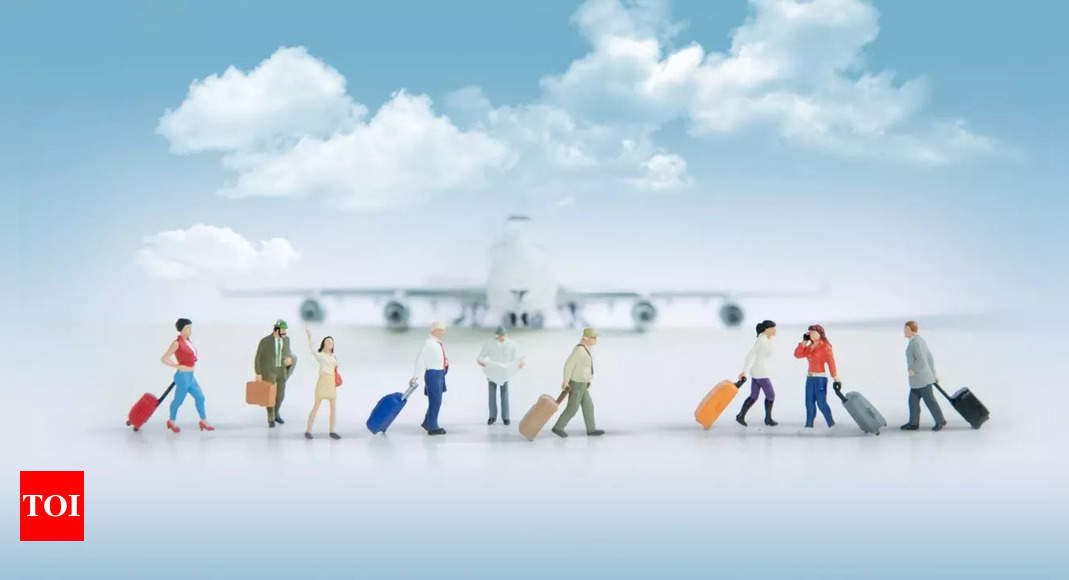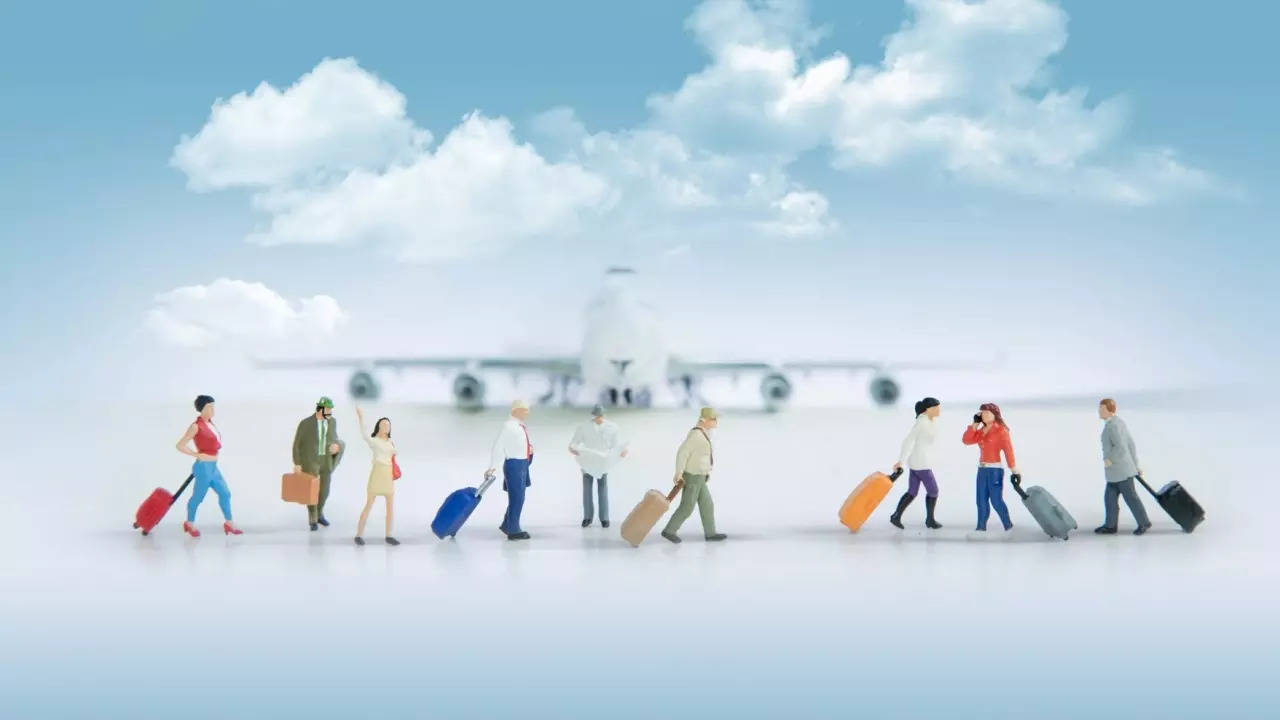[ad_1]
Airfares surge! Travellers preparing to take domestic flights this summer will need to budget more as airfares have spiked by 20-25 per cent due to Vistara flight cancellations and high air travel demand. Industry experts have noted that the airline sector is facing challenges in meeting the surge in demand, leading to the use of larger aircraft on domestic routes.
According to a PTI report, Vistara, dealing with pilot shortages, has reduced 25-30 flights daily, which is 10 percent of its total capacity. This reduction comes at a time when the industry is already operating with fewer aircraft due to Go First’s bankruptcy and IndiGo grounding over 70 planes due to engine issues.
Spot fares on specific routes have seen a significant increase, with some witnessing a surge of up to 39 per cent in early April compared to March, states an analysis by travel portal ixigo.
Notably, one-way spot fares for flights from Delhi to Bengaluru soared by 39 percent, while those from Delhi to Srinagar rose by 30 per cent. The analysis also revealed a 12 per cent increase for Delhi-Mumbai services and an 8 per cent rise for Mumbai-Delhi services.
Also Read | Flight delayed after boarding? New rule offers big relief to flyers stuck inside aircraft
Bharatt Malik, Senior VP of Air and Hotel Business at Yatra Online, projects an average airfare surge of 20-25 percent on both domestic and international routes in the current summer schedule.
He is of the view that Vistara’s decision to cut flights by 10 percent is a key factor influencing airfares on major domestic routes, leading to a substantial price hike on routes like Delhi-Goa, Delhi-Kochi, Delhi-Jammu, and Delhi-Srinagar. Malik said that escalating fuel costs, and increased summer travel demand have also led to the increase in airfares.
Vistara, which is operating over 300 daily flights in the current summer schedule, announced a reduction of 25-30 flights per day to enhance operational resilience, bringing its capacity back to February 2024 levels.
ixigo said the 20-25 percent surge in spot fares on certain routes has been due to rising demand ahead of the peak summer travel season and some flight cancellations. It sees air fares stabilizing once flight schedules normalize.
Also Read | What are the flight ticket cancellation charges? IndiGo vs Air India vs SpiceJet vs Akasa Air – check rules
Jagannarayan Padmanabhan, Senior Director at CRISIL Market Intelligence and Analytics, anticipates a 5-7 percent airfare increase, particularly on trunk routes like Delhi-Mumbai and Mumbai-Bengaluru, affecting travelers during the upcoming busy season. “As we enter the busy season, we anticipate a 5-7 percent increase in airfare, with pricing pressure particularly notable on trunk routes like Delhi-Mumbai and Mumbai-Bengaluru. Given that much of the upcoming travel will be for personal reasons and with family, the impact is expected to be substantial. Consequently, a considerable number of travellers might choose rail travel for shorter distances instead,” he was quoted as saying.
Malik said there has been a 20 percent rise in flight prices to popular domestic destinations like Ladakh, Manali, and Goa, reflecting a surge in demand for staycations and seasonal getaways.
According to a PTI report, Vistara, dealing with pilot shortages, has reduced 25-30 flights daily, which is 10 percent of its total capacity. This reduction comes at a time when the industry is already operating with fewer aircraft due to Go First’s bankruptcy and IndiGo grounding over 70 planes due to engine issues.
Spot fares on specific routes have seen a significant increase, with some witnessing a surge of up to 39 per cent in early April compared to March, states an analysis by travel portal ixigo.
Notably, one-way spot fares for flights from Delhi to Bengaluru soared by 39 percent, while those from Delhi to Srinagar rose by 30 per cent. The analysis also revealed a 12 per cent increase for Delhi-Mumbai services and an 8 per cent rise for Mumbai-Delhi services.
Also Read | Flight delayed after boarding? New rule offers big relief to flyers stuck inside aircraft
Bharatt Malik, Senior VP of Air and Hotel Business at Yatra Online, projects an average airfare surge of 20-25 percent on both domestic and international routes in the current summer schedule.
He is of the view that Vistara’s decision to cut flights by 10 percent is a key factor influencing airfares on major domestic routes, leading to a substantial price hike on routes like Delhi-Goa, Delhi-Kochi, Delhi-Jammu, and Delhi-Srinagar. Malik said that escalating fuel costs, and increased summer travel demand have also led to the increase in airfares.
Vistara, which is operating over 300 daily flights in the current summer schedule, announced a reduction of 25-30 flights per day to enhance operational resilience, bringing its capacity back to February 2024 levels.
ixigo said the 20-25 percent surge in spot fares on certain routes has been due to rising demand ahead of the peak summer travel season and some flight cancellations. It sees air fares stabilizing once flight schedules normalize.
Also Read | What are the flight ticket cancellation charges? IndiGo vs Air India vs SpiceJet vs Akasa Air – check rules
Jagannarayan Padmanabhan, Senior Director at CRISIL Market Intelligence and Analytics, anticipates a 5-7 percent airfare increase, particularly on trunk routes like Delhi-Mumbai and Mumbai-Bengaluru, affecting travelers during the upcoming busy season. “As we enter the busy season, we anticipate a 5-7 percent increase in airfare, with pricing pressure particularly notable on trunk routes like Delhi-Mumbai and Mumbai-Bengaluru. Given that much of the upcoming travel will be for personal reasons and with family, the impact is expected to be substantial. Consequently, a considerable number of travellers might choose rail travel for shorter distances instead,” he was quoted as saying.
Malik said there has been a 20 percent rise in flight prices to popular domestic destinations like Ladakh, Manali, and Goa, reflecting a surge in demand for staycations and seasonal getaways.
[ad_2]
Source link


